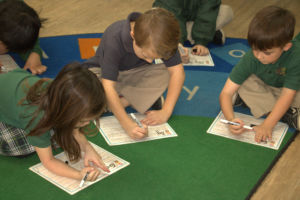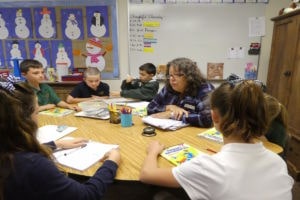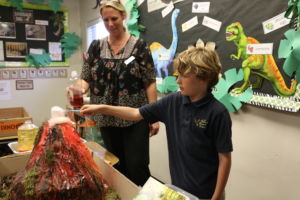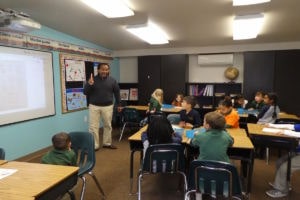 Language Arts
Language Arts
Children progress through our program from learning basic reading and writing skills in Kindergarten to finishing elementary school writing in all forms, such as persuasive, narrative, research papers and poetry and understanding fundamental essential reading strategies, such as inference, generalization, summarizing, character development, nonfiction and essential questioning.Our lower elementary students utilize the “Superkids” curriculum, which integrates reading, spelling, handwriting, grammar, and composition into one program. Taught through exciting and unique characters, children are continually engaged in the activities, making language learning fun.
In upper elementary, we continue working on these key areas by applying them to many aspects of our curriculum through research papers, oral presentations, problem analysis and more.
Language Arts
Children progress through our program from learning basic reading and writing skills in Kindergarten to finishing elementary school writing in all forms, such as persuasive, narrative, research papers and poetry and understanding fundamental essential reading strategies, such as inference, generalization, summarizing, character development, nonfiction and essential questioning.
Our lower elementary students utilize the “Superkids” curriculum, which integrates reading, spelling, handwriting, grammar, and composition into one program. Taught through exciting and unique characters, children are continually engaged in the activities, making language learning fun.
In upper elementary, we continue working on these key areas by applying them to many aspects of our curriculum through research papers, oral presentations, problem analysis and more.
 Mathematics
Mathematics
Here at Phoenix Ranch, we follow the “Singapore Math” curriculum, a system of learning in which adult supervision and independent practice go hand in hand. Students are provided with the necessary learning experiences beginning with the concrete and pictorial stages, followed by the abstract stage to enable them to learn mathematics meaningfully. This approach encourages an active thinking process, communication of mathematical ideas and problem solving, which helps develop the foundation students will need for more advanced mathematics.
The world of scientific discovery is brought to life for our young learners through many hands-on experiences, such as raising baby chicks, overseeing the growth of our garden and conducting many laboratory experiments.
Mathematics
Here at Phoenix Ranch, we follow the “Singapore Math” curriculum, a system of learning in which adult supervision and independent practice go hand in hand. Students are provided with the necessary learning experiences beginning with the concrete and pictorial stages, followed by the abstract stage to enable them to learn mathematics meaningfully. This approach encourages an active thinking process, communication of mathematical ideas and problem solving, which helps develop the foundation students will need for more advanced mathematics.
The world of scientific discovery is brought to life for our young learners through many hands-on experiences, such as raising baby chicks, overseeing the growth of our garden and conducting many laboratory experiments.
 Science
Science
By teaching our students how science, technology, engineering and mathematics (STEM) disciplines intersect, they come to understand the functioning of a system as a whole. Even in our younger grades, we look at big ideas, such as simple machines, construction, weather and sound/vibration and experiment with multi-disciplinary concepts to give our students a well-rounded education.
Our Aerospace Connections Education Program, sponsored by the Civil Air Patrol helps extend our STEM curriculum. All Phoenix Ranch elementary school teachers are Aerospace Education Members, equipping them to provide engaging and meaningful cross-curricular aerospace lessons that support science, technology, engineering, and math initiatives. Some of our students have even had their experiments launched into space on NASA rockets.
Science
By teaching our students how science, technology, engineering and mathematics (STEM) disciplines intersect, they come to understand the functioning of a system as a whole. Even in our younger grades, we look at big ideas, such as simple machines, construction, weather and sound/vibration and experiment with multi-disciplinary concepts to give our students a well-rounded education.
Our Aerospace Connections Education Program, sponsored by the Civil Air Patrol helps extend our STEM curriculum. All Phoenix Ranch elementary school teachers are Aerospace Education Members, equipping them to provide engaging and meaningful cross-curricular aerospace lessons that support science, technology, engineering, and math initiatives. Some of our students have even had their experiments launched into space on NASA rockets.
 Spanish
Spanish
Our Spanish program seeks to teach children the fundamental Spanish language skills, but also introduce them to the traditions and heritage of cultures so important to the fabric of our region. Our program is aligned with the five goals of the National Standards for Foreign Language Learning: communication, culture, connections, comparisons and community. We utilize storytelling techniques to give our students a more enjoyable learning experience with optimal participation.
Students in the lower elementary grades (TK-2) begin with introductory Spanish. Our objective is to build a strong vocabulary foundation through a teaching approach called Total Physical Response (TPR). We engage our students in movement activities to reduce inhibitions and lower stress, which can be common when learning a new language.
Our upper elementary and middle school students work to master Spanish I & II. Here, we stress the importance of communicating with other people in our community and understanding their various cultures. In order to do so, we supplement our classroom instruction with field trips to Olvera Street and Pupuseria El Clavel, where students can immerse themselves in the Spanish language and cultures.
Spanish
Our Spanish program seeks to teach children the fundamental Spanish language skills, but also introduce them to the traditions and heritage of cultures so important to the fabric of our region. Our program is aligned with the five goals of the National Standards for Foreign Language Learning: communication, culture, connections, comparisons and community. We utilize storytelling techniques to give our students a more enjoyable learning experience with optimal participation.
Students in the lower elementary grades (TK-2) begin with introductory Spanish. Our objective is to build a strong vocabulary foundation through a teaching approach called Total Physical Response (TPR). We engage our students in movement activities to reduce inhibitions and lower stress, which can be common when learning a new language.
Our upper elementary and middle school students work to master Spanish I & II. Here, we stress the importance of communicating with other people in our community and understanding their various cultures. In order to do so, we supplement our classroom instruction with field trips to Olvera Street and Pupuseria El Clavel, where students can immerse themselves in the Spanish language and cultures.


